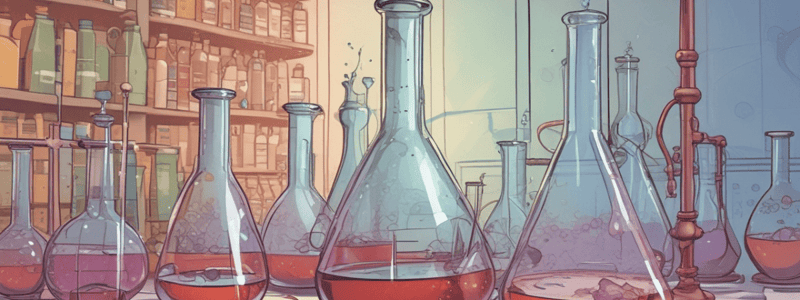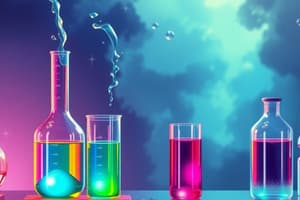Podcast
Questions and Answers
What is the purpose of swirling the conical flask during a titration experiment?
What is the purpose of swirling the conical flask during a titration experiment?
- To wash down any solution adhering to the sides of the flask (correct)
- To mix the acid and base solutions thoroughly
- To speed up the colour change
- To prevent the solution from overflowing
What is the reason for standardising acid solutions?
What is the reason for standardising acid solutions?
- Because acid solutions are always volatile
- Because acid solutions are not reactive
- Because acid solutions are highly concentrated
- Because acid solutions are unstable and can vary in concentration (correct)
What is the purpose of the indicator Methyl Orange in a titration experiment?
What is the purpose of the indicator Methyl Orange in a titration experiment?
- To neutralise the acid solution
- To catalyse the reaction between acid and base
- To indicate the equivalence point of the reaction (correct)
- To increase the concentration of the acid solution
What is the formula used to calculate the concentration of the unknown acid solution in a titration experiment?
What is the formula used to calculate the concentration of the unknown acid solution in a titration experiment?
Why is it necessary to use a base to standardise an acid solution?
Why is it necessary to use a base to standardise an acid solution?
What is the purpose of diluting the vinegar in the titration experiment?
What is the purpose of diluting the vinegar in the titration experiment?
What is the role of phenolphthalein in the titration experiment?
What is the role of phenolphthalein in the titration experiment?
What is the purpose of using a pipette to transfer 25 cm³ of vinegar into a volumetric flask?
What is the purpose of using a pipette to transfer 25 cm³ of vinegar into a volumetric flask?
What is the purpose of inverting the volumetric flask 10 times after adding deionised water?
What is the purpose of inverting the volumetric flask 10 times after adding deionised water?
What is the purpose of titrating hydrated sodium carbonate against a standardised acid?
What is the purpose of titrating hydrated sodium carbonate against a standardised acid?
What is the percentage of water in the hydrated compound?
What is the percentage of water in the hydrated compound?
What is the mole ratio of Na₂CO₃ to Na₂CO₃×H₂O?
What is the mole ratio of Na₂CO₃ to Na₂CO₃×H₂O?
Flashcards are hidden until you start studying
Study Notes
Titration
- Acid from the burette is dropped into the conical flask, and the flask is constantly swirled as the acid is added.
- Any solution adhering to the sides of the conical flask can be washed down with DI water from a wash bottle.
- Acid is added until a colour change occurs, and this is known as the 1ˢᵗ titration.
- 2 accurate titrations are then carried out to determine the value of the unknown concentration of the acid.
Titration Calculations
- Write out titration conclusion
- Use ratio from chemical equation to work out moles of unknown solution
- Find concentration of unknown using moles & volume
- Work out number of moles of known solution
Standardizing Acids
- Acids are generally unstable solutions, and their concentrations can vary due to HCl being volatile, HNO₃ being volatile, and H₂SO₄ being hygroscopic.
- These acids must be standardized with a base.
Acid & Base Titrations
- Indicator used: Methyl Orange
- Colour change: Yellow → Peach/Pink
- Experiment 1: Standardisation of HCl
Vinegar Titrations
- Vinegar contains ethanoic acid
- Experiment 2: Vinegar vs. NaOH
- Indicator used: Phenolphthalein
- Colour change: Pink → Colourless
- Steps in solving vinegar titration questions:
- Work out the concentration of titrated vinegar
- Take account of the dilution factor
- Convert g/L into % w/v
- Calculate the concentration of ethanoic acid in the original vinegar
Experiment 3: Water of Crystallisation
- Some substances involved in neutralisation reactions contain water in their crystalline structure
- Sodium carbonate can either be anhydrous or hydrated
- Hydrated sodium carbonate is represented as Na₂CO₃.xH₂O
- By titrating this base against a standardised acid, we can work out both the value of x and the % water of crystallisation in the structure
Solving Water of Crystallisation Q’s
- Solve for the concentration of the base
- Convert M → g/L…….× Mr
- Use actual volume to get mass of anhydrous base
- Find the % water of crystallisation
Studying That Suits You
Use AI to generate personalized quizzes and flashcards to suit your learning preferences.



